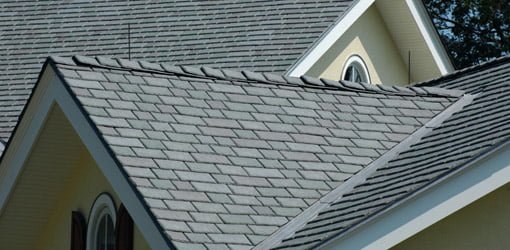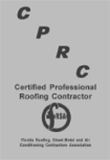Studies have shown that most serious injuries per dollar volume happen to small residential crews. Why leave your home exposed? Make sure your contractor carries Worker’s Compensation insurance. The cost of Worker’s Compensation is less than ten percent of the total cost of the roof, so why take the chance?
From natural materials like slate and wood to man-made products such as asphalt, sheet metal, and plastic polymers; there are more types and styles of roofing to choose from today than ever before. While each has its advantages and shortcomings, they all can add a distinctive design element to your home. So which one is right for you?
There are many factors to consider when selecting a roof including:
Some types of roofing may be better suited for your house than others. Factors such as the slope of the roof and strength of the framing could limit your choices. In areas prone to wildfires or hurricanes, look for a product with a high fire rating or good wind resistance. In addition, steps can be taken during the installation of many types of roofing to improve their resistance to fire or wind. Below is a rundown on the different types of roofing available.

Asphalt shingles are the most popular type of roofing for homes, comprising over 80% of residential roofing market.

While more expensive than asphalt, metal roofing lasts longer and is more wind resistant.

These durable synthetic roofing shingles resemble either wood shakes or slate.

While brittle and heavy, clay tiles can last a long time and are very fire resistant.

Less expensive than clay tiles, concrete roof tiles are also heavy but can last a long time and are very fire resistant.

Slate is one of the oldest roofing materials. Though brittle and expensive, it is very durable and resists both wind and fire.

Wood shingles and shakes made from rot resistant woods have low fire resistance unless treated.
The following table gives an overview of the various materials available. Weight and cost are listed per square of roofing (100 square feet) and include both labor and materials. Actual price may vary depending on the particular product used, the complexity of the job, and labor costs in different parts of the country. The cost per year indicates the price of the labor and materials per square over the roof’s projected life.
| Product | Weight/Square | Lifespan | Cost/Square | Cost/Year |
|---|---|---|---|---|
| Asphalt (3-tab) | 190-250 lb. | 15-20 yr. | $75-$125 | $4-$8 |
| Asphalt (laminated) | 240-340 lb. | 20-30 yr. | $125-$200 | $4-$10 |
| Metal (coated steel) | 80-150 lb. | 30-50 yr. | $250-$450 | $5-$15 |
| Plastic Polymer | 70-300 lb. | 50+ yr. | $400-$650 | $7-$13 |
| Clay Tile | 600-1,800 lb. | 50+ yr. | $800-$1,000 | $13-$20 |
| Concrete Tile | 550-1,000 lb. | 50+ yr. | $300-$500 | $5-$10 |
| Slate | 800-1,000 lb. | 75+ yr. | $1,100-$2,000 | $10-$20 |
| Wood (cedar) | 200-350 lb. | 15-25 yr. | $350-$450 | $14-$30 |
There are two warranties to consider when roofing your home. The manufacturer’s warranty covers defects in the roofing material. A separate warranty may be issued by the roofing contractor to handle problems arising from improper installation.
A warranty is no better than the company that writes it, so make sure the product comes from a reputable manufacturer with the financial resources to stand behind it. This applies to the roofing contractor as well, since a fly-by-night roofer may be long gone before their guarantee expires.
It is important to read the warranty carefully to see what is covered and excluded. Some warranties are not transferable when you sell your house while others are limited to the cost of materials or are prorated over time.
Your roof is your home’s single most important defense when it comes to protecting it from the elements, so it makes sense to make sure it’s done right.
Yes, anyone who is incorporated and has three people or less, all three of the owners can be exempt. However, Worker’s Compensation on owners is inexpensive, only fifteen to twenty percent. Foremen cost less as well, only the roofers who are really at risk are expensive and even then the cost is less than fifty percent. There is also a Drug Free Workplace discount and a five percent Safety discount, and they are a member of FRSA’s (Florida Roofing and Sheet Medal Association) Self Insurance Program, there are mid year and year end discounts. Usually, the average bottom line cost is under thirty percent.
In order to have a license, you must post a bond. The theory behind the bond is to insure that if you damage someone’s home, the homeowner can go to the bonding company for repair costs. The problem is that the cost of the bond has not kept up with inflation. If someone does three to four million dollars annually and you are number fifteen on the list, a 10,000.00 bond will not go far. Everyone is supposed to have liability insurance, unfortunately, there is no real check to make sure that they do not have a 100,000.00 liability policy with a 50,000.00 deductible or if once the license was purchased the insurance policy was canceled. Ask to see the policy and you can then call that insurance company to ensure that the policy is in effect.
Ask to see their roofing license. It should either be a State Certified Roofing Licensed or a Local Roofing License; an Occupational License is not a Roofing License, but it is required to purchase a Roofing License. You cannot legally pull a permit, or do a roofing job without a Roofing License. If in doubt call the Building Department or check My Florida.
In order to buy a permit, the contractor needs a Notice of Commencement signed and notarized by the owner; so if the work is started without one, start to worry. Most contractors will run the legal for you and provide a notary to come to your home and notarize your signature. They then file the Notice of Commencement and purchase the permit. The permit should be posted on your home for you to see. If you are unsure, call the building department and make sure a permit was purchased before you pay your bill. If you are looking to go about this on your own and you are the owner of the home, then all you have to do is head to your building department and request a permit for a reroof project.
You will need roofing contractors information, unless this is DIY project. You will need a permit pulled, and inspections to be scheduled to verify and approve the completed work. Doing the job right the first time will keep you protected during this process.
No, they are supposed to be, but the yellow pages does not verify this information. Usually the ads are very misleading, to find out the real story on someone, go to MyFlorida.com. You may find that someone who advertises they have been in business in Florida since 1960, was born in 1960, opened in 1985, was out of business in 1987, reopened again in 1988 then out of business again in 1990, etc. Always ask for at least three references and call them.
https://blog.zlien.com/construction-payment/floridas-notice-to-owner-nto-requirement/
The materials vendor can send a Notice To Owner within 45 days of the last materials he supplied for your home. He then has one year to file a lien. Get a release for any materials that should have been used on your house.
Do not hire anyone who is not licensed, bonded and insured, and never hire anyone who does not have an advertisement in the yellow pages. Select a contractor that has operated in your community for at least ten years. Do not give money for any work that has not already been done. Always ask for a release of lien before paying your balance. Always ask for a material vendors release of lien before you pay your bill.
You can sign a contract, pay a down payment and never see the roofer again or you can sign a contract, they deliver the materials on your roof, set a dumpster in the front of your garage and you never see them again. If they haven’t been around for a long period of time there is no guarantee that they will be around to do any repair or warranty work that your roof may need. There are many variations on this scheme, all with the same result. Hopefully, the scheme plays itself out before your roof is torn off and your house is exposed. Play it safe with a licensed, bonded and insured contractor and call on references before purchase.
Our team of roofers will come out, introduce themselves to you, professionally remove your old roof, install your new roof and leave your roof and yard areas completely clean (no debris or nails).
